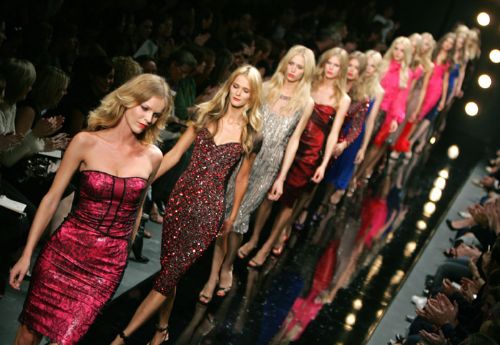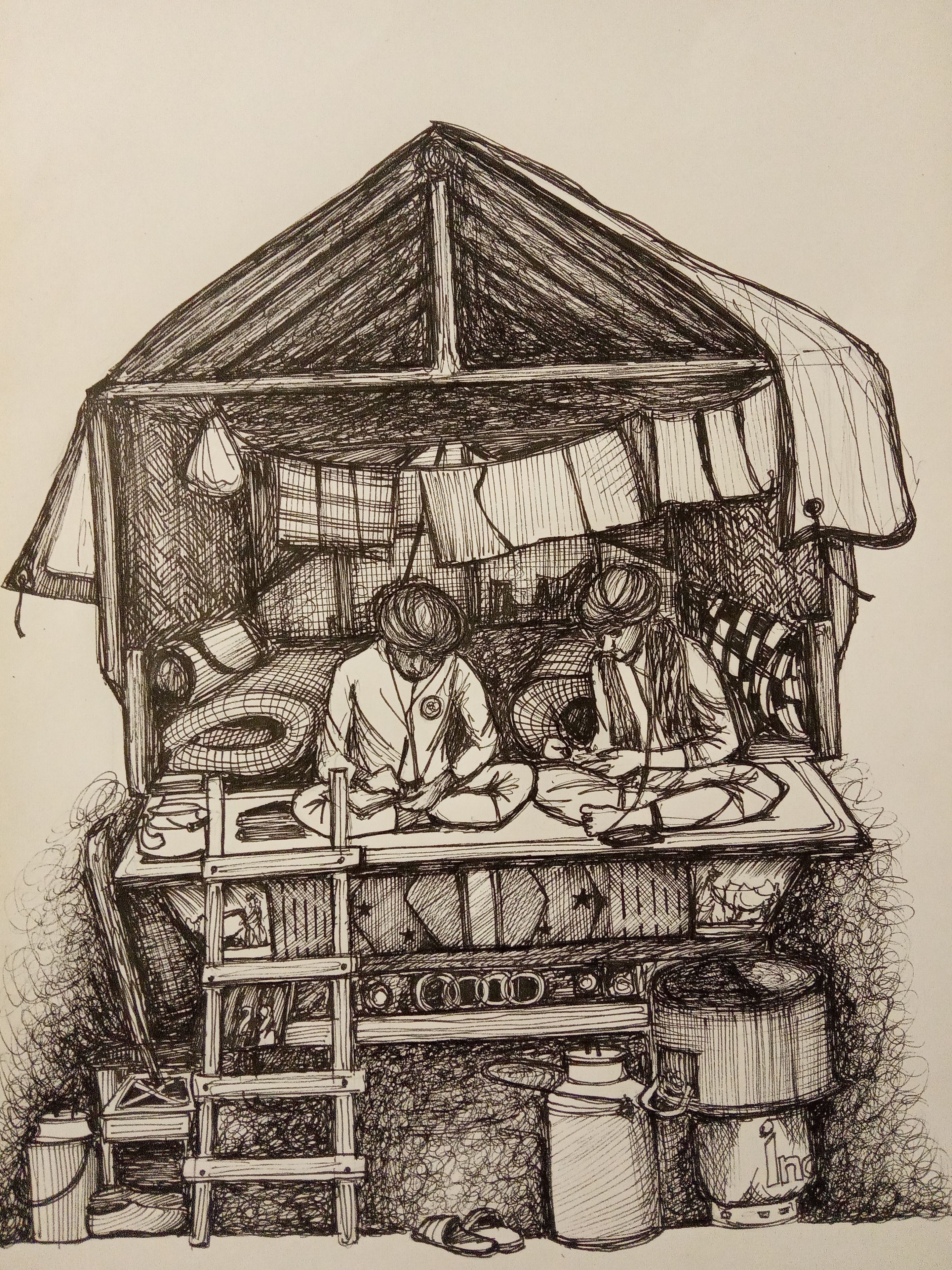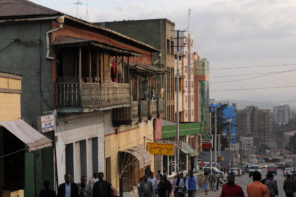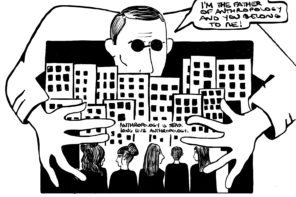As part of my doctoral research on workers in the fashion industry in Paris and Brussels, I conducted fieldwork for a year and a half. I had found an agreement with Franck, a young Belgian designer highly appreciated by the press and the media. In return for allowing me to observe his work, I helped his team of collaborators in the preparation of the show organised in the context of the “Fashion Week” in Paris. I spent 3 weeks in his studio in Brussels, working from 9 am to 6 pm and I supported his team for a week during its stay in Paris. But how was the agreement made? I learnt that Frank was looking for some assistants. Here is the announcement that circulated on a job announcements website, followed by my application.
A Brussels-based studio producing prêt-à-porter is looking for a trilingual intern able to carry out multiple tasks
Job Description
The position will be given to an intern and includes the following tasks :
• Preparing and sending press kits to customers or prospects (via email or mail)
• Ensuring the follow-up of payments for outstanding invoices (customers + suppliers)
• Preparing the showroom twice a year
• Entering new clients and their contact details (delivery addresses , VAT … ) in the Excel database
• Sending orders at the end of the season (fax or email ) and request confirmation of reception
• Organizing meetings
• Ensuring the follow-up in Excel of sales results by season, customer and supplier
• Writing and translation of mail
• Administrative Support
• General Assistance
• Versatility: planning management, reception of incoming calls …
• Accounting: payment of bills, preparation of invoices, preparation of VAT, preparation of accounting documents
• Distribution: dispatch of goods to customers twice a year
Job’s requirements
We are looking for the following profile : • Perfectly bilingual French / Dutch and with a very good command of English (ideally trilingual)
• Flexible, structured , methodical and engaged
• Good computer skills (Mac , Excel, Office … )
• Ideally, a student about to graduate in management or secretarial work.
Working conditions
We offer an internship in a diverse and interesting position and in a pleasant environment. We cover food expenditures. • Minimum 3 to 6 months
Giulia the anthropologist
Hello Franck ,
This is Giulia , the Italian anthropologist who interviewed you last year. Do you remember me? I’m writing to you because I learnt that you are looking for an assistant who could help you with organizing your work. As you may remember, I’m doing a doctoral research on the fashion industry, and more specifically on the people who work in it.
For the past year I did many interviews, but the most useful for me to understand how this fascinating and complex world works is to be present there, to be there with those who are part of it.
Here is my proposal: I cannot cover the assistant position full time, because I have my commitments with the university, and because probably I do not have all the necessary skills to fully assist you the way you need. However, having studied for 13 years and speaking 5 languages (English, French , Spanish, Portuguese , Italian) , and having worked as a hostess, saleswoman, actress, teacher, waitress, etc etc, I think I could give you a hand, and I would be happy to do so. This does not prevent you from having an assistant, of course. I could be a more punctual support, and I can for example make myself available full-time before, during, and after the fashion week. I have a place where to stay in Paris. If my proposal attracts your attention and if you are curious, let’s have a coffee and talk about it .
Yours,
Giulia

What makes this internship so desirable?
During all the interviews, candidates motivated their application by the “passion” that they fed for fashion, for working in fashion, and for Franck’s work. One day Pilar was absent so Franck received Elizabeth, a young woman with prior experience in graphic design, freshly graduated from a fashion school in Paris, who had come by train from the French capital, portfolio in hand, to try and convince Frank that she was the ideal candidate.
Seeing that Frank was not convinced by her profile, she said:
– What can I do to get closer to you?
– But here you know, you’re not going to do anything special, you’re going to be exploited. Actually it’s a double exploitation, you exploit me to see how it’s done, and I’ll exploit you by making you work.
– I really want to be exploited by you, fashion is my passion and I love what you do.
Elizabeth was not selected for the internship, because Franck was not convinced by her profile and competences. However, her speech is interesting because it condenses the main themes of my research: “immaterial” labour, emotional labour, exploitation and precariousness. In the immaterial labour of the postfordist era the nature and form of work do not only change but so does its meaning: its value is often mainly derived from intangible factors and not only from monetary compensation. The discourse of Asia in Paris, the day of Franck’s fashion show illustrates this point. I was walking with her to the venue of the show. She was very happy because Franck had just offered her to work for him again after the summer to update his website. She said: “I love this guy, I’m so happy that he made this offer to me, I’ll do anything for him, I love what he does, and in September I will come even if it is on a voluntary basis because I really want to work for him. “ Asia is not an exception: the affective dimension of the work is the hallmark of late capitalism. At another point of my participant observation Eva, a collaborator of Franck (one of the two workers illegally paid), told me: ”I love my job, I love what I do, I know I could make a little more money working in a bar, but I’m not interested. I’d rather be here, and do what I love.”
The separation between work and monetary compensation is very common in immaterial labor. Economist Andrea Fumagalli and independent researcher Cristina Morini explain the process of normalization of unpaid work in the following way:
Precarization as loss of the guarantee of continuity of income and rights, calls for an artificial enthusiasm and a power of self-conviction strong enough to make the subject accept to sacrifice himself in a regime of voluntary work. (Fumagalli-Morini, 2008).
But are these dynamics that different in the academia? I let you reflect on this exchange of emails I recently had with a professor whom I met at a seminar and who offered me to collaborate in one of her projects:
Dear Giulia,
(…) Are you happy to contribute to our project with two weeks of teaching on research methods for ethnographic research? (…)
Dear Margaret,
Thank you very much for thinking about me for this interesting project.
There is no mention of the financial side of the project, could you please provide me with more details?
Dear Giulia,
I’m sorry I didn’t specifically refer to the financial aspect: this is a standard within our Academic funding schemes. According to it, the researcher coming from an EU country does not have a special salary, but all mobility expenses are covered by the project. So, you would receive payment for your travel and accommodation expenses, and a daily allowance for your expenses. The purpose is to have some exchange of ideas, while also enriching the researcher training programme. Do you agree to be part of our application then?
I have already mentioned your name in the application draft materials, and would be really happy to have you on board!
Dear Margaret,
I’d be glad to take part in this project, but i’m afraid it won’t be possible for this time. Apart from the financial aspect, I’ll be finishing my PhD and I really need to use the last months of my scholarship for writing. I’m sure you can understand.
Dear Giulia,
When will you be finishing your PhD? This is not for next year, is it? You still have a couple of years before you, don’t you?
Dear Margaret,
I don’t know exactly when my Phd is going to be finished, it depends on my supervisor as well. Please don’t take it personally, but for material and ethical reasons I cannot afford to work without a salary. As you probably remember, I work on the precarisation of the “immaterial workers”, and I do believe that work, even when interesting, enriching and pleasurable, has to be financially remunerated. I keep my fingers crossed for your application.
———————–
Boltanski, Luc, et Chiapello Eve. 2011. Le Nouvel Esprit Du Capitalisme Postface Inédite. [Paris]: Gallimard.
Fumagalli, Andrea, et Cristina Morini. 2008. “Segmentation du travail cognitif et individualisation du salaire.” Multitudes n° 32 (1) (February 29): 65–76.
Gill, Rosalind, et Andy Pratt. 2008. “In the Social Factory? Immaterial Labour, Precariousness and Cultural Work.” Theory, Culture & Society 25 (7-8) (December 1): 1–30.
Holmes, Brian. 2002. “The flexible personality.” http://eipcp.net/transversal/1106/holmes/en
Molé, Noelle J. 2010. “Precarious Subjects: Anticipating Neoliberalism in Northern Italy’s Workplace.” American Anthropologist 112 (1): 38–53.
NB: All the names appearing in these fieldnotes are pseudonyms.









